新目标八年级英语上册知识点总结-新目标
新目标八年级英语上册知识点总结-新目标[整理]
![新目标八年级英语上册知识点总结-新目标[整理]](https://img.taocdn.com/s3/m/5f965cc6c8d376eeaeaa31db.png)
新目标八年级英语上册语法复习1) leave的用法1.“leave+地点”表示“离开某地”。
例如: When did you leave Shanghai? 你什么时候离开上海的?2.“leave for+地点”表示“动身去某地”。
例如: Next Friday, Alice is leaving for London. 下周五,爱丽斯要去伦敦了。
3.“leave+地点+for+地点”表示“离开某地去某地”。
例如: Why are you leaving Shanghai for Beijing? 你为什么要离开上海去北京?2) 情态动词should“应该”学会使用 should作为情态动词用,常常表示意外、惊奇、不能理解等,有“竟会”的意思,例如: How should I know? 我怎么知道?Why should you be so late today? 你今天为什么来得这么晚? should有时表示应当做或发生的事,例如: We should help each other.我们应当互相帮助。
我们在使用时要注意以下几点:1.用于表示“应该”或“不应该”的概念。
此时常指长辈教导或责备晚辈。
例如: You should be here with clean hands. 你应该把手洗干净了再来。
2. 用于提出意见劝导别人。
例如: You should go to the doctor if you feel ill.如果你感觉不舒服,你最好去看医生。
3. 用于表示可能性。
should的这一用法是考试中常常出现的考点之一。
例如: We should arrive by supper time. 我们在晚饭前就能到了。
She should be here any moment. 她随时都可能来。
3) What...? 与 Which...? 1. what 与 which 都是疑问代词,都可以指人或事物,但是what仅用来询问职业。
人教版新目标八年级英语上册1、2、3、4单元知识点总结材料

新目标八年级英语上册第一单元Unit 1.How often do you exercise?I. 重点短语归纳:on weekends 在周末1. go to the movies 去看电影2. look after=take care of 照顾、照看3. surf the internet 上网4. healthy lifestyle 健康的生活方式5. go skateboarding 去滑滑板watch TV看电视6. keep healthy=stay healthy = keep in good health 保持健康keep + 形容词表保持某种状态do some reading 阅读7. exercise= take/do (much) exercise=do sports锻炼8. eating habits 饮食习惯9. take more exercise 做更多的运动10. the same as 与什么相同11. once a month一月一次12. be different from 不同13. twice a week一周两次.three times a week一周三次14. make a difference to 对什么有影响As teachers, you must believe that you can make a difference to the li ves of your students. 身为教师,你们必须坚信你们能够影响学生的一生。
A false step will make a great difference to my future.错走一步对我的前程来说会产生很大影响。
15.how often 多久一次,询问动作发生的频率一般用once a week ,twice a month ,every day ,sometimes等回答。
人教版新目标英语八年级上册各单元知识点总结梳理归纳汇总
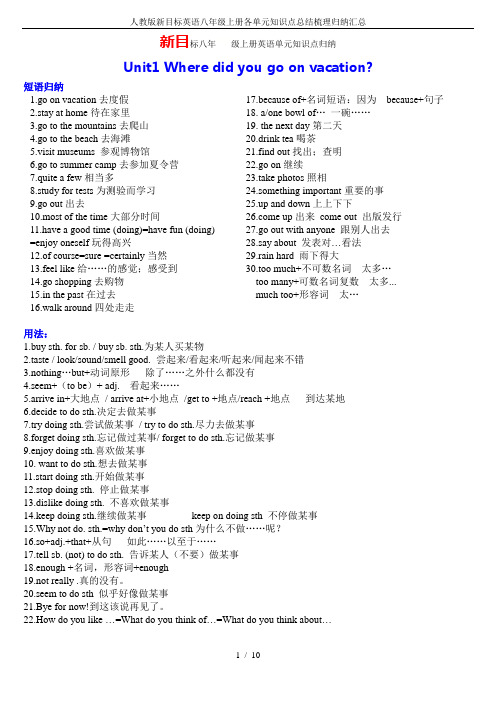
人教版新目标英语八年级上册各单元知识点总结梳理归纳汇总新目标八年级上册英语单元知识点归纳Unit1 Where did you go on vacation? 短语归纳1.go on vacation去度假2.stay at home待在家里3.go to the mountains去爬山4.go to the beach去海滩5.visit museums 参观博物馆6.go to summer camp去参加夏令营7.quite a few相当多8.study for tests为测验而学习9.go out出去10.most of the time大部分时间11.have a good time (doing)=have fun (doing) =enjoy oneself玩得高兴12.of course=sure =certainly当然13.feel like给……的感觉;感受到14.go shopping去购物15.in the past在过去16.walk around四处走走17.because of+名词短语:因为because+句子18. a/one bowl of…一碗……19. the next day第二天20.drink tea喝茶21.find out找出;查明22.go on继续23.take photos照相24.something important重要的事25.up and down上上下下e up出来come out 出版发行27.go out with anyone 跟别人出去28.say about 发表对…看法29.rain hard 雨下得大30.too much+不可数名词太多…too many+可数名词复数太多...much too+形容词太…用法:1.buy sth. for sb. / buy sb. sth.为某人买某物2.taste / look/sound/smell good. 尝起来/看起来/听起来/闻起来不错3.nothing…but+动词原形除了……之外什么都没有4.seem+(to be)+ adj. 看起来……5.arrive in+大地点/ arrive at+小地点/get to +地点/reach +地点到达某地6.decide to do sth.决定去做某事7.try doing sth.尝试做某事/ try to do sth.尽力去做某事8.forget doing sth.忘记做过某事/ forget to do sth.忘记做某事9.enjoy doing sth.喜欢做某事10. want to do sth.想去做某事11.start doing sth.开始做某事12.stop doing sth. 停止做某事13.dislike doing sth. 不喜欢做某事14.keep doing sth.继续做某事keep on doing sth 不停做某事15.Why not do. sth.=why don’t you do sth为什么不做……呢?16.so+adj.+that+从句如此……以至于……17.tell sb. (not) to do sth. 告诉某人(不要)做某事18.enough +名词,形容词+enough19.not really .真的没有。
新目标八年级英语上册知识点总结-新目标[整理]
![新目标八年级英语上册知识点总结-新目标[整理]](https://img.taocdn.com/s3/m/ff9d8371168884868762d688.png)
新目标八年级英语上册语法复习1) leave的用法1.“leave+地点”表示“离开某地”。
例如:When did you leave Shanghai?你什么时候离开上海的?2.“leave for+地点”表示“动身去某地”。
例如:Next Friday, Alice is leaving for London.下周五,爱丽斯要去伦敦了。
3.“leave+地点+for+地点”表示“离开某地去某地”。
例如:Why are you leaving Shanghai for Beijing?你为什么要离开上海去北京?2) 情态动词should“应该”学会使用should作为情态动词用,常常表示意外、惊奇、不能理解等,有“竟会”的意思,例如:How should I know? 我怎么知道?Why should you be so late today? 你今天为什么来得这么晚?should有时表示应当做或发生的事,例如:We should help each other.我们应当互相帮助。
我们在使用时要注意以下几点:1.用于表示“应该”或“不应该”的概念。
此时常指长辈教导或责备晚辈。
例如:You should be here with clean hands. 你应该把手洗干净了再来。
2. 用于提出意见劝导别人。
例如:You should go to the doctor if you feel ill.如果你感觉不舒服,你最好去看医生。
3. 用于表示可能性。
should的这一用法是考试中常常出现的考点之一。
例如:We should arrive by supper time. 我们在晚饭前就能到了。
She should be here any moment. 她随时都可能来。
3) What...? 与Which...?1. what 与 which 都是疑问代词,都可以指人或事物,但是what仅用来询问职业。
新目标英语8年级上册1-5单元知识点
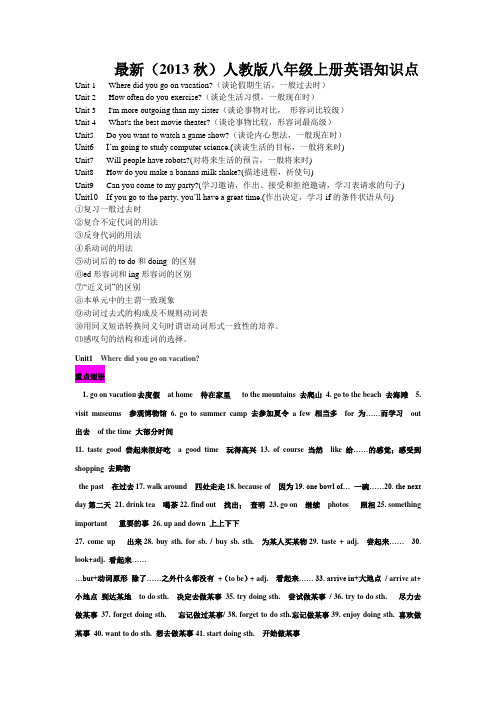
最新(2013秋)人教版八年级上册英语知识点Unit 1 Where did you go on vacation?(谈论假期生活,一般过去时)Unit 2 How often do you exercise?(谈论生活习惯,一般现在时)Unit 3 I'm more outgoing than my sister(谈论事物对比,形容词比较级)Unit 4 What's the best movie theater?(谈论事物比较,形容词最高级)Unit5 Do you want to watch a game show?(谈论内心想法,一般现在时)Unit6 I’m going to study computer science.(谈谈生活的目标,一般将来时)Unit7 Will people have robots?(对将来生活的预言,一般将来时)Unit8 How do you make a banana milk shake?(描述进程,祈使句)Unit9 Can you come to my party?(学习邀请,作出、接受和拒绝邀请,学习表请求的句子) Unit10 If you go to the party, you’ll have a great time.(作出决定,学习if的条件状语从句)①复习一般过去时②复合不定代词的用法③反身代词的用法④系动词的用法⑤动词后的to do和doing 的区别⑥ed形容词和ing形容词的区别⑦“近义词”的区别⑧本单元中的主谓一致现象⑨动词过去式的构成及不规则动词表⑩用同义短语转换同义句时谓语动词形式一致性的培养。
⑾感叹句的结构和连词的选择。
Unit1 Where did you go on vacation?重点短语1. go on vacation去度假at home 待在家里to the mountains 去爬山4. go to the beach 去海滩 5. visit museums 参观博物馆6. go to summer camp 去参加夏令a few 相当多for 为……而学习out 出去of the time 大部分时间11. taste good 尝起来很好吃 a good time 玩得高兴13. of course 当然like 给……的感觉;感受到shopping 去购物the past 在过去17. walk around 四处走走18. because of 因为19. one bowl of… 一碗……20. the next day第二天21. drink tea 喝茶22. find out 找出;查明23. go on 继续photos 照相25. something important 重要的事26. up and down 上上下下27. come up 出来28. buy sth. for sb. / buy sb. sth. 为某人买某物29. taste + adj. 尝起来…… 30. look+adj. 看起来………but+动词原形除了……之外什么都没有+(to be)+ adj. 看起来…… 33. arrive in+大地点/ arrive at+小地点到达某地to do sth. 决定去做某事35. try doing sth. 尝试做某事/ 36. try to do sth. 尽力去做某事37. forget doing sth. 忘记做过某事/ 38. forget to do sth.忘记做某事39. enjoy doing sth. 喜欢做某事40. want to do sth. 想去做某事41. start doing sth. 开始做某事42. stop doing sth. 停止做某事43. have a good time=enjoy oneself=have fun(doing sth.)玩得痛快44. keep doing sth. 继续做某事45. Why not do. sth.? 为什么不做……呢46. so+adj.+that+从句如此……以至于…… 47. tell sb. (not) to do sth. 告诉某人(不要)做某事三、重点句子:1. Where did you go on vacation? 你去哪儿度假的?2. Long time no see. 好久不见。
新人教新目标版八年级英语上册短语语法知识点汇总

人教版八年级英语上册短语语法知识点总结初二英语课组2019年[由我校初二英语科组根据最新考纲和近几年中考的趋势加上我校学生的实际情况,结合初二全体英语科组的力量,汇编了这一份重点总结,编好一份学案不易,望同学们能好好利用。
]Unit 1 Where did you go on vacation一、必背单词短语。
Section A1.Where did you go on vacation? (P. 1)on vacation意为“在度假”,结构“on+名词”表示“在某种状态中”。
例句:My family went to Hainan on vacation last year.2....visited my uncle (P. 1)visit此处用作及物动词,后接人或物做宾语,意为“拜访、看望”,后接表示地点的名词,意为“参观、游览”。
例句:I visited my grandmother last week.例句:Do you want to visit Shanghai?3....go with anyone? (P. 2)(1)anyone用作不定代词,意为“有人、任何人”,相当于anybody,用于疑问句和否定句中,在肯定句中用someone或者somebody。
但是anyone也可以用在肯定句中,表示“任何一个人”。
例句:Did you meet anyone friendly in that city?例句:Anyone can be helpful in some way.(2)anyone只能指人,不可以指物,后面不接of短语;any one既可以指人也可以指物,后可接of短语。
例句:You can ask any one of us about this question.4....buy anything special? (P. 2)(1)buy用作双宾语动词,表示“买”,常用的结构为“buy sb. sth.”或者“buy sth. for sb.”,表示“为某人买某物”。
新目标八年级英语上册第三单元知识点总结(Unit4Howdoyougettoschool?)

新目标八年级英语上册第三单元知识点总结(Unit 4 How doyou get to school? )Unit 4 How do you get to school?一.短语归纳1. take the subway to … = go to … by subway 搭地铁2. take the train to … = go to … by train 坐火车3. take a bus to … = go to …by bus = go to … on a bus 乘坐公共汽车4. take a taxi to … = go to … by taxi 坐的士5. ride a bike/ bicycle to… = go to … by bike/ bicycle 骑自行车6. walk to… = go to … on foot 步行7. take a car to… = go to … in a car= go to … by car 坐汽车8. get to school 到达学校get to=arrive in/at=reach 到达 (in加大地方at加小地方)9. 10 kilometers from school 离学校10公里(远)10. from…to… 从…到… from his home to school 从他家到学校11. how (用于提问状态和交通工具)怎样how long 用来询问时间的长度(用于提问时间段多长(时间))或物体的长度how often (用于提问频率)多久时间一次how far (用于提问距离)多远how many 用于提问数量)多少how much(用于提问数量/价钱)多少/多少钱how soon“过多久”,用来询问某事要在多久以后才能发生12. have a quick breakfast 快速地吃早餐13. leave for school 出发去学校14. the early bus 早班车15. take sb. to school 带某人去学校Then the early bus takes him to school.然后,他乘坐早班车到学校16. bus ride 搭公车的路程17. bus stop 公车亭18. bus station 公车站bus stop 是指小站,bus station指大的站,比如汽车站。
新版新目标英语八年级上册知识点总结

U n i t1W h e r e d i d y o u g o o n v a c a t i o n1.go on vacation去度假vacation假期、假日=holiday,on vacation = on holiday 度假the long vacation 长假the summer vacation 暑假 the Christmas vacation 圣诞假期goonvacation/tothemountains/tothebeach/tosummercamp 去度假,去爬山,去沙滩,去夏令营2.buy anything special 买特别的东西1buy v买;购买过去式为bought buysb.sth=buysthforsb. 给某人买某物2anything不定代词,某事;某件东西主要用于疑问句或否定句中Do you want to buy anything for meI can’t say anything about it.3)anthing special特别的东西 adj修饰不定代词时后置4 something,anything,nothing,everything是指物的不定代词;somebody,someone,anybody,anyone, nobody,everybody,everyone是指人的不定代词;somewhere,anywhere,nowhere,everywhere是指地点的不定代词;5 这些不定代词做主语时,谓语动词用第三人称单数 Is everybody here 大家都到齐了吗6 something,somebody,someone,somewhere用于肯定句及表示请求或建议的疑问句中,而anything, anybody,anyone,anywhere用于否定句及疑问句中;Did you do anything interesting 你做了有趣的事吗表疑问3. anywhere adv 在任何地方 Did you go anywhere during the summer vacationanywhere 在任何地方常用于否定句和疑问句中I can’t find it anywhere.somewhere 在某处;到某处常用于肯定句中 I lost my key somewhere near here.4.take photos 照相;拍照5. quite a few 很多;不少修饰可数名词复数quite a little 很多;不少修饰不可数名词afew+可数名词复数表肯定 few+可数名词复数表否定alittle+不数名词表肯定 little+不可数名词表否定6.most of the time大部分时间 most为代词,大部分;大多数most of………中的大多数它作主语时,谓语动词取决于most of后所修饰的名词Most of us are going to the park. 我们大多数人要去公园;Most of the food goes bad. 大部分的食物都变质了;7.have a good time = enjoy oneself = have fun 玩得开心 + doingWe had a good time visiting the the Great Wall.= We enjoyed ourselves visiting the the Great Wall.= We had fun visiting the the Great Wall.8.How did you like it 你觉得它怎么样How do/did you like……你觉得……怎么样用来询问对方的观点或看法,=What do you think of……=How do/did you feel about……9. go shopping去购物;去买东西=do some shopping.go+doing 形式表示去做某事,常用于表达从事某一体育活动或休闲活动go skating 去滑冰 go hiking 去徒步旅行 go sightseeing 去观光go fishing去钓鱼 go swimming 去游泳 go boating 去划船10.a friend’s farm是名词所有格形式;一般情况下,表示“有生命的人或物”的名词后面加’s,表示所属关系;The red bike is Alice’s.那辆红色的自行车是爱丽斯的;名词所有格的构成:1单数名词词尾加’s ,复数名词词尾没有s,也要加’sthe girl ‘s pen女孩的钢笔women’s shoes女鞋on Children’s Day2复数名词以s结尾的只加’the students’ reading room学生阅览室Teachers’ Day教师节3如果两个名词并列,并且分别有’s,则表示“分别有”;只后一个名词有一个’s,则表示“共有”:John’s and Kate’s rooms.约翰和凯特各自的房间;Lily and Lucy’s father. 莉莉和露西的爸爸同一个爸爸;4表示无生命的名词一般以...of...构成短语,表示所有关系;a map of China一幅中国地图 the name of the story那个故事的名字11.seem v 好像;似乎;看来1seem+adj. 看起来…… You seem happy today.你今天看起来很高兴;2seem+to do sth. 似乎,好像做某事I seem to have a cold.我似乎感冒了;=It seems that I have a cold.3)It seems/seemed+从句看起来好像…;似乎…It seems that no one believes you.看起来好像没有人相信你4 seem like 好像,似乎12.nothing much to do 没什么事可做nothing...but... 除....之外什么也没有,只有 but+ n/v原形I have nothing to do but watch TV.Thereisnothingmuchtodobutread.除了读书没什么可做的13. bored boringbored 厌烦的;感到无聊的一般在句中修饰人boring 无聊的;令人厌烦的一般在句中修饰事或物beboredwith对…感到无聊interested adj. 感兴趣的 interesting adj. 有趣的 surprised adj. 感到惊奇的surprising adj. 惊奇的tired 累的 tiring 令人疲惫的 excited 兴奋的 exciting 令人兴奋/激动的amazed 惊讶的 amazing 令人惊讶的14.say about 发表对....的看法enjoyable adj 愉快的;快乐的 enjoy doing sth . 喜欢做…乐意做…enjoy oneself =have a good = have fun 过得愉快15.arrive v 到达 arrive in表示到达较大的地方,如国家、省、市等arrive at表示到达较小的地方,如机场、商店、广场、村庄等;地点副词home,here,there前介词省略arrive in+大地点 / arrive at+小地点②get to +地点③reach+地点16.decide v 决定 n decisiondecide to do sth. 决定做某事 decide not to do sth决定不要做某事decide on doing sth. 决定做某事make a decision to do sth.decidetodosth=makeadecisiontodosth决定做某事decide后常跟疑问词+动词不定式做宾语17.try v 其后常接名词、动名词或不定式,尝试;试图,设法;努力1trytodosth努力做…表示想尽一切办法要把事情办成,强调付出努力设法去完成;2trydoingsth尝试做表示一种尝试、做做看的想法,不一定付出很多努力;3try/doone’sbesttodo尽力做4haveatry试一试 try n 尝试18.feel like给……的感觉;感受到其后常接从句;He feels like he is swimming. 他感觉像在游泳一样;feel like 想要……其后可接名词、代词或动名词;feel like sth. 想要某物 feel like doing sth. 想要做某事19. building n 建筑物;楼房build v建造,建筑built,built,The workers built many tall buildings in our school last year.20.wonder v 想知道;琢磨其后常接who, what, why等疑问词引导的宾语从句;I wonder what they were doing here.我想知道他去哪里了;21.walk around 四处走走He’s just walking around the village.他只是在村庄里随便走走;22.difference n 差别,差异 adj different不同的;有差异的What is the difference between this book and that book My schoolbag is different from yours.1tellthedifferencesbe tween..and…说出…与…的区别2makeadifferenceto对…有影响,有意义3 be different from 与……不同 be the same as23. 常用的感叹句的结构:1What +adj.+ 复数名词 / 不可数名词+主语+谓语2What +a/an+adj.+可数名词单数+主语+谓语3How +adj. +a/an+可数名词单数+主语+谓语4How+adj./adv. +主语+谓语What an interesting book it is = How interesting a book is 那本书多么有趣啊24. want to do sth. =想要做某事 start doing sth. 开始做某事=start to do sth.take the train 乘火车”,take乘坐25.a little 一点儿修饰动词、形容词或副词;也可修饰不可数名词;26. wait for等候其后可接人或物Tom was waiting for a bus over there.27. over prep多于;超过=more than;My father is over 40 years old.There are over eight hundred students in our school.28. too many 太多其后接可数名词复数; He always has too many questions to ask me.too many + 可数名词复数太多...too much + 不可数名词太多...much too + 形容词 /副词太...29. becauseof+宾语名词/动名词/代词因为,由于becauseconj.+句子因为引导状语从句I didn’t buy the shirt because it was too expensive.He lost his job because of his age.30. below 表示下方,低于反义词为 above 在......上面under表示在正下方31. bring 带来;拿来指从别处带到说话者所在地take 拿走;带走指从说话者所在地带到别处去bring sth.to +地点,带来其反义词是takePlease bring your book to our school. 请把你的书带到我们学校来;Please take your book to your school. 请把你的书带到你的学校去;32.enough adj 足够的,充分的修饰adj或adv,一般置于被修饰词之后1enough+n足够多的用来修饰名词时放在名词之前2adj/advenoughtodosth足够…We have enough time to do our homework. The box is big enough.33. forget to do sth.与forget doing sth.forget to do sth. 忘记要做某事事情还没做Don’t forget to close the window.forget doing sth. 意为“忘记做过某事事情已经做过了 I forget closing the window.stoptodo停下来去做另外一件事,stopdoing停下来做某事34.why not为什么不呢一般用在疑问句中,表示提建议;why not后面需跟动词原形;Why not + 动词原形 =Why don’t you+ 动词原形Why not go to the party with me =Why don’t you go to the party with me提建议的句子What/ how about +doing sth. Why don’t you + do sth. Why not + do sth.Let’s + do sth. Shall we/ I + do sth.35. with prep 具有;带有with作介词时的其他用法1“和……一起’ I often go to school ______ my friend. 我经常和朋友们一起去上学;2以手段、材料,用工具, Cut the apple with a knife. 用刀切苹果;36.s o … that 如此…以致于引导结果状语从句,so adv+adj/adv. that+从句She was so sad that she couldn’t say a word. 她悲伤得一句话也说不出来;so that 引导目的状语从句以便,为了so…that…/ such…that…如此…以致引导的结果状语从句so+adj./adv.+that…He is ____lovely a boy____we love him very much.The little boy is so young that he can’t go to school.37. tell sb not to do sth. 告诉某人不要做某事keep doing sth. 继续做某事,一直做某事38. jump up and down in excitement. 兴奋地蹦上蹦下up and down 上上下下;来来回回在句中作状语;They looked me ______ ______ ______. 他们上上下下打量我;He walks______ ______ ______ in the room. 他在房间里来回走动;jump into 跳入 jump off 跳离 jump over 跳过 jump out of 跳出39. comeup太阳出来;出现,发生40. 反身代词:myself , ourselves, yourself , yourselves, himself, herself, itself, themselves.作动词或介词的宾语:经常在enjoy, teach, hurt, buy, introduce, dress, kill等动词和by, for, to, of等介词后作宾语;一年主考宾语回自身He is teaching himself English.她在自学英语;talk to oneself自言自语 live by oneself独自住 Help yourself 请随便吃吧/请自己去取吧Make yourself at home 别客气 make yourself heard /understood. 使你的话被人听得见/理解 teach oneself 自学=learn by oneself by oneself 独自for oneself 为自己;替自己 enjoy oneself 玩的愉快 dress oneself 给自己穿衣41. onthetopof在…的上面 takeanumbrellawithsth随身携带一把伞longtimenosee好久不见 inthecountryside在农村keepadiary记日记 enjoydoing享受做… walkuptosp.往上走到某地rideabiketosp.=gotosp.onthebike=gotosp.bybike骑自行车去某地rainhard/heavily雨下得大 abowof一碗42. taste good 尝起来好吃系动词+adjkeep保持stay保持seem好像look看来像smell闻起来sound听起来taste尝起来feel摸起来。
新版新目标英语八年级上册知识点总结

新版新目标英语八年级上册知识点总结Unit7 Will people have robortsSection A1.一般将来时(1)概念: 一般将来时是表示将来某个时间将要发生的动作或存在的状态。
I am going to / shall watch a football match on TV this evening. 今天晚上我将看一场足球比赛。
(2)结构①肯定式:主语 + 助动词will/shall + 动词原形 + 其他(wil用于各种人称,shall用于第一人称)=主语 + be going to + 动词原形 + 其他will表示单纯将来概念,be going to强调事先经过考虑安排而计划或打算要做某事(意图) Are you going to post that letter由某种迹象判断某事有可能发生(预见) It’s going to rain.②否定式:在will/shall/be 后面加 not. will not = won’t③一般疑问句:将will/shall/be 提到主语前面。
be 某地有某物它有不同时态。
(1) 过去时态:There was/ were…. 表某地过去有某物(2) 现在时态:There is/ are …. 表某地现在有某物(3) 将来时态:There will be …= There is/are going to be…表某地将有某物(4)句式①一般疑问句形式:Will there be + 主语 + 其他。
②肯定回答:Yes, there will. 否定回答是:No, there won’t.③否定形式:There won’t be + 主语 + 其他,将不会有……④特殊疑问句: 疑问词/ 词组 + 一般疑问句When will there be a nice match何时会有一场精彩的球赛(6) there be句型中不能用have\has(7) there be 表示某地存在某物强调的是客观存在着的东西。
人教版新目标八年级英语上册1-5单元知识点总结

新目标八年级英语上册第一单元Unit 1.How often do you exercise?I. 重点短语归纳:on weekends 在周末1. go to the movies 去看电影2. look after=take care of 照顾3. surf the internet 上网4. healthy lifestyle 健康的生活方式5. go skateboarding 去滑滑板watch TV看电视6. keep healthy=stay healthy = keep in good health 保持健康keep + 形容词表保持某种状态do some reading 阅读7. exercise= take/do (much) exercise=do sports锻炼8. eating habits 饮食习惯9. take more exercise 做更多的运动10. the same as 与什么相同11. once a month一月一次12. be different from 不同13. twice a week一周两次.three tim es a week一周三次14. make a difference to 对….有影响As teachers, you must believe that you can make a difference to the lives of your students. 身为教师,你们必须坚信你们能够影响学生的一生。
A false step will make a great difference to my future.错走一步对我的前程来说会产生很大影响。
15. how often 多久一次,询问动作发生的频率how many times 多少次,用来提问做某事的次数16. although=though虽然 <不能与but连用>Although he is old, he is quite strong.(He is old, but he is quite strong.)句子中,有although或though就不可再用but,但可用yet或still“仍然,还”;有because就不能再用so.17. as for至于18. activity survey活动调查19. do homework做家庭作业20. do house work 做家务事23. eat less meat吃更少的肉24. junk food垃圾食物25. be good for 对什么有益26. be bad for对什么有害27. want to do sth 想做某事28. want sb to do sth想某人做某事29. try to do sth 尽量做某事30. come home from school放学回家31. of course=certainly=sure当然32. get good grades取得好成绩33. some advice 一些建议some advice 中的advice 是不可数名词 a piece of advice 一则建议give advice 提出建议take one’s advice 采纳或听从某人的建议4. help sb to do sth帮助某人做某事=help sb with sth35. a lot of vegetables=many vegetables许多蔬菜36. hardly= almost not几乎不 hardly ever很少,几乎不,从不37. keep/be in good health保持健康38. your favorite program你最喜欢的节目39. Animal World 动物世界40. play soccer踢足球41.every day 每天every day 与 everyday1. every day 作状语,译为“每一天”。
人教版新目标英语八年级上册unit3单元知识点归纳总结
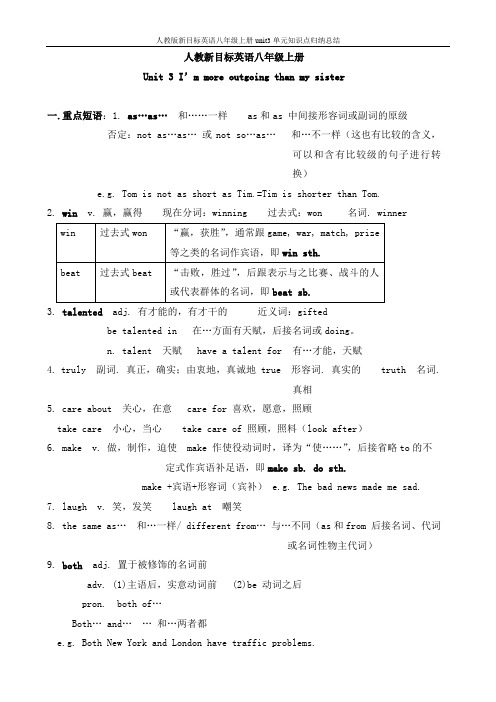
人教新目标英语八年级上册Unit 3 I’m more outgoing than my sister一.重点短语:1. as…as…和……一样 as和as 中间接形容词或副词的原级否定:not as…as…或not so…as…和…不一样(这也有比较的含义,可以和含有比较级的句子进行转换)e.g. Tom is not as short as Tim.=Tim is shorter than Tom.2. win v. 赢,赢得现在分词:winning 过去式:won 名词. winner3. talented adj. 有才能的,有才干的近义词:giftedbe talented in 在…方面有天赋,后接名词或doing。
n. talent 天赋 have a talent for 有…才能,天赋4. truly 副词. 真正,确实;由衷地,真诚地 true 形容词. 真实的 truth 名词.真相5. care about 关心,在意 care for 喜欢,愿意,照顾take care 小心,当心 take care of 照顾,照料(look after)6. make v. 做,制作,迫使 make 作使役动词时,译为“使……”,后接省略to的不定式作宾语补足语,即make sb. do sth.make +宾语+形容词(宾补) e.g. The bad news made me sad.7. laugh v. 笑,发笑 laugh at 嘲笑8. the same as…和…一样/ different from…与…不同(as和from 后接名词、代词或名词性物主代词)9. both adj. 置于被修饰的名词前adv. (1)主语后,实意动词前 (2)be 动词之后pron. both of…Both… and……和…两者都e.g. Both New York and London have traffic problems.Both she and I are good at English.10. serious adj. 严肃的,稳重的;认真的 be serious about …对……认真adv. seriously 认真地,严肃地 nothing serious 没什么严重的11. as long as (1) 用于 as…as 句型中,表示“像…一样长”(2) 表示时间,“达…之久”。
新目标英语八年级上知识点总结

新目标英语八年级上知识点总结Revised final draft November 26, 2020U n i t3I’m m o r e o u t g o i n g t h a n m y s i s t e r话题:本单元以描述朋友外表和个性特征,比较个人与朋友间的差异为题材,增进朋友间的相互了解。
教学目标:使学生掌握形容词副词的比较级运用比较级来描述个人与朋友间的差异知识点1.形容词、副词比较级○1规则变化A.直接在词尾加-erfew-fewer long-longer small-smaller light-lighter tall-tallerB.以不发音的字母e结尾,直接加rNice-nicer large-largerC.以重读闭音节结尾并且末尾只有一个辅音字母,双写该辅音字母加erthin-thinner big-bigger hot-hotter wet-wetter red-redderD.以辅音字母+y结尾的,变y为i加erheavy-heavier easy-easierE.多音节和部分双音节词 more +该词○2不规则变化有少数形容词、副词的比较级和最高级是不规则的,必须熟记。
good好的 well好;(身体)好的, better更好的 best最好的bad,badly糟糕的,糟糕地/ill(身体)不舒服的 worse更糟糕的,更糟糕地;(身体)更不舒服的 worst最糟糕的,最糟糕地;(身体)最不舒服的many许多的(可数)/much许多的(不可数);非常 more更多的;更 most最多的;最little少的 less更少的 least最少的far远的;远地 farther更远的;更远地further/进一步的(地) farthest最远的;最远地 furthest最深刻的(地)old老的 older年龄较大的;较旧的 oldest年龄最大的;最旧的elder仅表兄弟姊妹之间的长幼 eldest仅表兄弟姊妹之间的长幼常用句型○1比较级+than 当than前后所使用的动词形式相同时,通常用助动词代替后面的动词,该动词或助动词可以省略。
新目标英语八年级上册1至6单元知识点总结

八年级上册1-6单元知识点总结第一单元一、应掌握的单词:1、exercise既可以做名词,也可以做动词,表示“锻炼,运动”时,是不可数名词,表示“练习,体操”时,是可数名词。
2、skateboard【动词】意为“踩滑板;参加滑板运动”,skate【动词】意为“滑冰;溜冰”,board【名词】意为“板”。
3、hardly=almost not 几乎不几乎不 4、active【形容词】意为“活跃的;积极的”,它的名词形式是activity.5、about=around大约大约 6、of course= sure=certainly当然当然 7、look after=take care of 照顾照顾 8、different【形容词】意为“不同的;有区别的” ,它的名词形式是difference.9、although=though虽然虽然 10、a lot of=lots of后面跟可数名词的复数或不可数名词。
11、must【情态动词】意为“必须”,后面跟动词原形,相当于have to.12、less【形容词】意为“较小的;更小的;较少的;更少的”,它是little的比较级。
的比较级。
二、应掌握的词组:1. go to the movies 去看电影去看电影2. watch TV看电视看电视3. surf the internet 上网上网 ,上网冲浪,上网冲浪 4.read English books读英语书读英语书5.do homework做家庭作业做家庭作业(do housework做家务事)做家务事)6.all students所有的学生100%7.most students大多数学生51-99% (= most of the students)8.some students 一些学生1-50%9.no students没有学生0%10.as for至于至于11. be good for 对什么有益对什么有益(be bad for对什么有害)对什么有害)12. come home from school放学回家放学回家 13. eating habits 饮食习惯饮食习惯饮食习惯14.pretty good非常好,不错非常好,不错15. junk food垃圾食物垃圾食物16. healthy lifestyle 健康的生活方式健康的生活方式健康的生活方式 17.kind of=a little=a little bit有点有点 18. help sb to do sth帮助某人做某事,帮助某人做某事, =help sb with sth 19. go skateboarding 去划板去划板去划板20. keep healthy=stay healthy 保持健康21. exercise=take (much) exercise=do sports锻炼锻炼22. take more exercise 做更多的运动做更多的运动 23. the same as 与什么相同与什么相同24. once a month一月一次一月一次25. be different from 不同不同26. twice a week一周两次一周两次一周两次27. make a difference to 对什么有影响对什么有影响 28. how often 多久一次多久一次多久一次29. shop=go shopping=do some shopping 购物购物30. activity survey活动调查活动调查31. eat less meat吃更少的肉吃更少的肉32. want to do sth 想做某事想做某事33. want sb to do sth想要某人做某事想要某人做某事 34. get good grades取得好成绩取得好成绩取得好成绩35. a lot of vegetables=many vegetables许多蔬菜许多蔬菜36. keep/be in good health保持健康保持健康三、 应掌握的句子:1.How often do you watch TV? 你多久看一次电视?你多久看一次电视?How often + 助动词(助动词(do 或does) + 主语主语 + do sth.?这个句型是用来提问在某一特定这个句型是用来提问在某一特定的时间里进行某个动作的次数,即“多久一次”。
八年级英语上册第一、二单元知识点总结(新目标版英语)
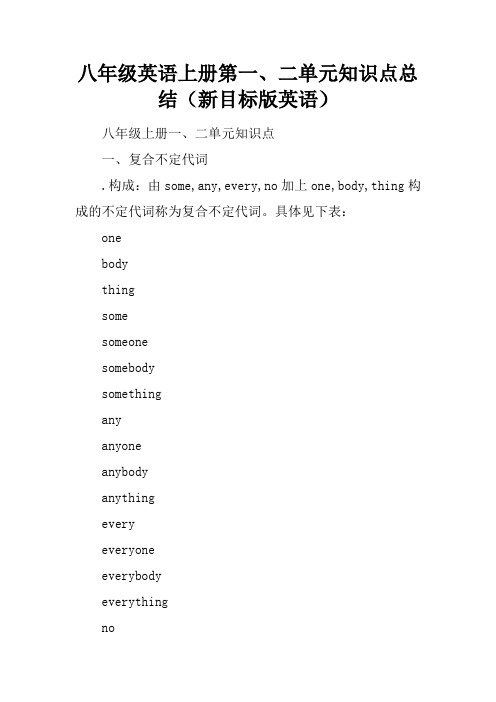
八年级英语上册第一、二单元知识点总结(新目标版英语)八年级上册一、二单元知识点一、复合不定代词.构成:由some,any,every,no加上one,body,thing构成的不定代词称为复合不定代词。
具体见下表:onebodythingsomesomeonesomebodysomethinganyanyoneanybodyanythingeveryeveryoneeverybodyeverythingnonoonenobodynothing2.用法:(1)复合不定代词被形容词、动词、不定式等修饰时,要放在它们的后面。
Ihavesomethingimportanttotellyou.我有重要的事情要告诉你。
Thereisnothingwrongwiththeradio.这个收音机没有毛病。
Doyouwantanythingtodrink?你想喝点什么吗?(2)复合不定代词作主语时,谓语动词用单数形式。
Everythingbeginstogrowinspring.春天万物开始生长。
Someoneiswaitingforyouatthedoor.有人在门口等你。
(3)肯定句中用含some,疑问句和否定句中用含any。
但在表示请求、建议、反问等的疑问句中,常用含有some 的不定代词。
wouldyoulikesomethingtoeat?你想要些吃的东西吗?(4)anyone,anything也可以用在肯定句中,前者表示“任何人”,后者表示“任何事”。
Anyonecandothis.任何人都会做这个。
Icananythingforyou.我能为你做任何事。
3.goonvacation“去度假”;vacation同义词为holiday,意为“假期”。
beonvacation“在度假”。
IwanttogoonvacationinHainanthiswinter.今年冬天我想去海南度假。
Theyareonvacationattheseaside.他们正在海边度假。
人教新目标英语八年级上册unit1-Unit4单元重点知识复习
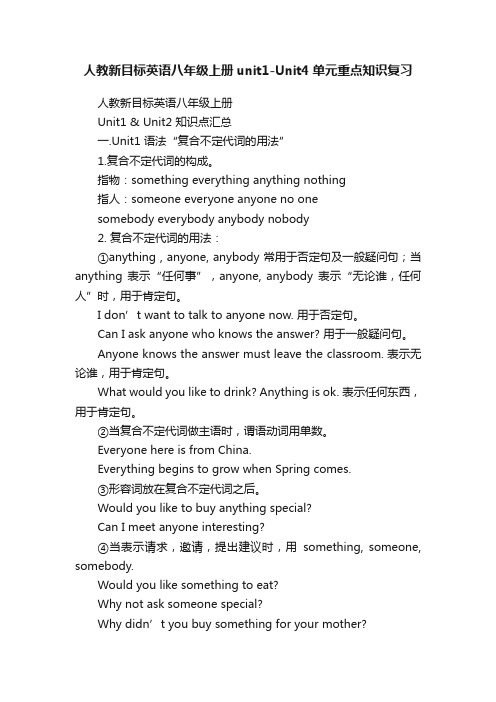
人教新目标英语八年级上册unit1-Unit4单元重点知识复习人教新目标英语八年级上册Unit1 & Unit2 知识点汇总一.Unit1 语法“复合不定代词的用法”1.复合不定代词的构成。
指物:something everything anything nothing指人:someone everyone anyone no onesomebody everybody anybody nobody2. 复合不定代词的用法:①anything , anyone, anybody 常用于否定句及一般疑问句;当anything 表示“任何事”,anyone, anybody 表示“无论谁,任何人”时,用于肯定句。
I don’t want to talk to anyone now. 用于否定句。
Can I ask anyone who knows the answer? 用于一般疑问句。
Anyone knows the answer must leave the classroom. 表示无论谁,用于肯定句。
What would you like to drink? Anything is ok. 表示任何东西,用于肯定句。
②当复合不定代词做主语时,谓语动词用单数。
Everyone here is from China.Everything begins to grow when Spring comes.③形容词放在复合不定代词之后。
Would you like to buy anything special?Can I meet anyone interesting?④当表示请求,邀请,提出建议时,用something, someone, somebody.Would you like something to eat?Why not ask someone special?Why didn’t you buy something for your mother?Unit2 语法“频率副词”How often 常用于对频率的提问,意为“多长时间一次”,其答语可以是once/ twice / three times a week; always/ usually/ often/ sometimes/ hardly ever/ never 等表示时间频率的副词及短语。
2023年新目标英语八年级上册全部知识点最新版
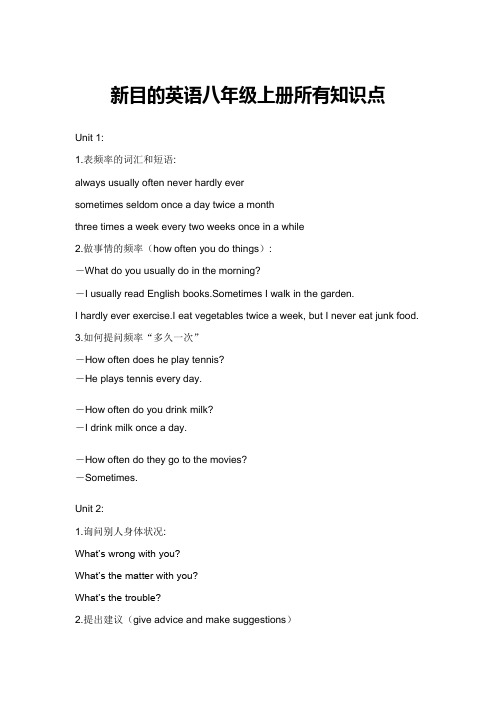
新目的英语八年级上册所有知识点Unit 1:1.表频率的词汇和短语:always usually often never hardly eversometimes seldom once a day twice a monththree times a week every two weeks once in a while2.做事情的频率(how often you do things):-What do you usually do in the morning?-I usually read English books.Sometimes I walk in the garden.I hardly ever exercise.I eat vegetables twice a week, but I never eat junk food.3.如何提问频率“多久一次”-How often does he play tennis?-He plays tennis every day.-How often do you drink milk?-I drink milk once a day.-How often do they go to the movies?-Sometimes.Unit 2:1.询问别人身体状况:What’s wrong with you?What’s the matter with you?What’s the trouble?2.提出建议(give advice and make suggestions)-What’s wrong with you?-I have a headache.-You should go to bed and have a rest.You shouldn’t work late.-I have a fever.-You should drink a lot of water.You shouldn’t be stressed out.Unit 3:一般将来时:1.现在进行时“be+动词ing”可以用来表达一个在最近按计划或安排要进行的动作。
新目标八年级英语上册知识点总结-新目标[整理]
![新目标八年级英语上册知识点总结-新目标[整理]](https://img.taocdn.com/s3/m/517b0663da38376baf1faece.png)
八年级英语第四单元复习I.应掌握的词组:1.get to school 到校2. get home 到家3. how about=what about…….怎么样?4.take the subway 乘地铁5.ride a bike 骑自行车6.take the bus乘公共汽车7.take the train乘火车8.take a taxi乘坐出租车9. go in a parent’s car 坐父母的车10. by bike, bike bus,by subway, by taxi,by car, by train(乘坐……车,放在句尾) 11. have a quick breakfast迅速吃早饭12. the early bus 早班车13. how far多远14. take sb. to sp.带某人到某处15. doing sth. takes sb. Some time/ money=It takes sb. some time/money to do sth.=sb. spends dome time/money (on sth.)=sb. spends some time/money (in) doing sth.=sth. costs sb. some time/money=sb. pay some money for sth.花费某人多少时间/金钱做某事/某人花费多少金钱/时间做某事16. bus stop公共汽车站,train station火车站,subway station地铁站,bus station客运站17. want to do sth.想做某事18.walk to school 步行上学19. in North America 在北美20. in other parts of the world在世界的其他地区21. depend on=depend upon依靠,靠……决定22. not all 不是所有的23. need to do sth.需要做某事24. number of students学生数25. a number of=many 许多number前可用large, great, small修饰其谓语是复数26.the number of….的数量,谓语是单数27. don’t worry(about sth./sb.)别着急(为某人/事担心28. around the world= all over the world世界各地,全世界II.应掌握的句子:1. How do you get to school? I walk to school.你是怎样到校的?我步行。
- 1、下载文档前请自行甄别文档内容的完整性,平台不提供额外的编辑、内容补充、找答案等附加服务。
- 2、"仅部分预览"的文档,不可在线预览部分如存在完整性等问题,可反馈申请退款(可完整预览的文档不适用该条件!)。
- 3、如文档侵犯您的权益,请联系客服反馈,我们会尽快为您处理(人工客服工作时间:9:00-18:30)。
新目标八年级英语上册语法复习1) leave的用法1.“leave+地点”表示“离开某地”。
例如:When did you leave Shanghai?你什么时候离开上海的?2.“leave for+地点”表示“动身去某地”。
例如:Next Friday, Alice is leaving for London.下周五,爱丽斯要去伦敦了。
3.“leave+地点+for+地点”表示“离开某地去某地”。
例如:Why are you leaving Shanghai for Beijing?你为什么要离开上海去北京?2) 情态动词should“应该”学会使用should作为情态动词用,常常表示意外、惊奇、不能理解等,有“竟会”的意思,例如:How should I know? 我怎么知道?Why should you be so late today? 你今天为什么来得这么晚?should有时表示应当做或发生的事,例如:We should help each other.我们应当互相帮助。
我们在使用时要注意以下几点:1.用于表示“应该”或“不应该”的概念。
此时常指长辈教导或责备晚辈。
例如:You should be here with clean hands. 你应该把手洗干净了再来。
2. 用于提出意见劝导别人。
例如:You should go to the doctor if you feel ill.如果你感觉不舒服,你最好去看医生。
3. 用于表示可能性。
should的这一用法是考试中常常出现的考点之一。
例如:We should arrive by supper time. 我们在晚饭前就能到了。
She should be here any moment. 她随时都可能来。
3) What...? 与Which...?1. what 与 which 都是疑问代词,都可以指人或事物,但是what仅用来询问职业。
如:What is your father? 你父亲是干什么的?该句相当于:What does your father do?What is your father's job?Which 指代的是特定范围内的某一个人。
如:---Which is Peter? 哪个是皮特?---The boy behind Mary. 玛丽背后的那个男孩。
2.What...? 是泛指,所指的事物没有范围的限制;而 Which...? 是特指,所指的事物有范围的限制。
如:What color do you like best?(所有颜色)你最喜爱什么颜色?Which color do you like best, blue, green or yellow?你最喜爱哪一种颜色?(有特定的范围)3. what 与 which 后都可以接单、复数名词和不可数名词。
如:Which pictures are from China? 哪些图片来自中国?4) 频度副词的位置1.常见的频度副词有以下这些:always(总是,一直)usually(通常)often(常常,经常)sometimes(有时候)never(从不)2.频度副词的位置:a.放在连系动词、助动词或情态动词后面。
如:David is often arrives late for school.大卫上学经常迟到。
b.放在行为动词前。
如:We usually go to school at 7:10 every day.我们每天经常在7:10去上学。
c.有些频度副词可放在句首或句尾,用来表示强调。
如:Sometimes I walk home, sometime I ride a bike.有时我步行回家,有时我骑自行车。
3.never放在句首时,主语、谓语动词要倒装。
如:Never have I been there.我从没到过那儿。
5) every day 与everyday1. every day 作状语,译为“每一天”。
如:We go to school at 7:10 every day.我们每天7:10去上学。
I decide to read English every day.我决定每天读英语。
2. everyday 作定语,译为“日常的”。
She watches everyday English on TV after dinner.她晚饭后在电视上看日常英语。
What's your everyday activity? 你的日常活动是什么?6) 什么是助动词1.协助主要动词构成谓语动词词组的词叫助动词(Auxiliary Verb)。
被协助的动词称作主要动词(Main Verb)。
助动词自身没有词义,不可单独使用,例如:He doesn't like English. 他不喜欢英语。
(doesn't是助动词,无词义;like是主要动词,有词义)2.助动词协助主要动词完成以下功用,可以用来:a. 表示时态,例如:He is singing. 他在唱歌。
He has got married. 他已结婚。
b. 表示语态,例如:He was sent to England. 他被派往英国。
c. 构成疑问句,例如:Do you like college life? 你喜欢大学生活吗?Did you study English before you came here?你来这儿之前学过英语吗?d. 与否定副词not合用,构成否定句,例如:I don't like him. 我不喜欢他。
e. 加强语气,例如:Do come to the party tomorrow evening. 明天晚上一定来参加晚会。
He did know that. 他的确知道那件事。
3.最常用的助动词有:be, have, do, shall, will, should, would7) forget doing/to do与remember doing/to do1.forget to do忘记要去做某事(未做);forget doing忘记做过某事(已做)The light in the office is still on. He forgot to turn it off.办公室的灯还在亮着,它忘记关了。
(没有做关灯的动作) He forgot turning the light off.他忘记他已经关了灯了。
( 已做过关灯的动作)Don't forget to come tomorrow.别忘了明天来。
(to come动作未做)典型例题---- The light in the office is still on.---- Oh,I forgot___.A. turning it offB. turn it offC. to turn it offD. having turned it off答案:C。
由the light is still on 可知灯亮着,即关灯的动作没有发生,因此用forget to do sth.而forget doing sth 表示灯已经关上了,而自己忘记了这一事实。
此处不符合题意。
2.remember to do记得去做某事(未做);remember doing记得做过某事(已做)Remember to go to the post office after school.记着放学后去趟邮局。
Don't you remember seeing the man before?你不记得以前见过那个人吗?8) It's for sb.和It's of sb.1.for sb. 常用于表示事物的特征特点,表示客观形式的形容词,如:easy, hard,difficult,interesting,impossible等:It's very hard for him to study two languages.对他来说学两门外语是很难的。
2.of sb的句型一般用表示人物的性格,品德,表示主观感情或态度的形容词,如:good, kind, nice, clever, foolish, right。
It's very nice of you to help me. 你来帮助我,你真是太好了。
3.for 与of 的辨别方法:用介词后面的代词作主语,用介词前边的形容词作表语,造个句子。
如果道理上通顺用of,不通则用for。
如:You are nice. (通顺,所以应用of)。
He is hard. (人是困难的,不通,因此应用for。
)9) 对两个句子的提问新目标英语在命题中有将对句子划线提问这一题型取消的趋势,现在采取的作法是对一个句子进行自由提问。
例如:句子:The boy in blue has three pens.提问:1. Who has three pens?2. Which boy has three pens?3. What does the boy in blue have?4. How many pens does the boy in blue have?很显然,学生多了更多的回答角度,也体现了考试的灵活性。
再如:句子:He usually goes to the park with his friends at 8:00 on Sunday.提问:1. Who usually goes to the park with his friends at 8:00 on Sunday?2. Where does he usually go with his friends at 8:00 on Sunday?3. What does he usually do with his friends at 8:00 on Sunday?4. With whom does he usually go to the park at 8:00 on Sunday?5. What time does he usually go to the park with his friends onSunday?6. When does he usually go to the park with his friends? 10) so、such与不定冠词的使用1.so与不定冠词a、an连用,结构为“so+形容词+a/an+名词”。
如:He is so funny a boy.Jim has so big a house.2.such与不定冠词a、an连用,结构为“such+a/an+形容词+名词”。
